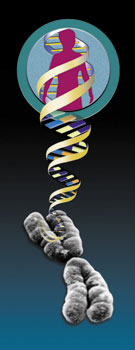Racial Biotech Business as Usual
If you thought that genomics had already exhausted the chamber of ethical horrors, think again.... By Eugene Thacker
 Now that the genome is ‘finished’, the question on everyone’s lips is what it all means: Programmable pills? Hotshot gene therapy? Crystal ball health care? Or, quite frankly, just a lot of data? While research continues into post-genomic fields such as proteomics and pharmacogenomics, one of the first immediate uses of the genome data has been in the practice of ‘population genomics’. Combining bioinformatics (computer science applied to molecular biology), molecular genetics, health care data, and genealogical records, population genomics has begun its task of databasing the population.
Now that the genome is ‘finished’, the question on everyone’s lips is what it all means: Programmable pills? Hotshot gene therapy? Crystal ball health care? Or, quite frankly, just a lot of data? While research continues into post-genomic fields such as proteomics and pharmacogenomics, one of the first immediate uses of the genome data has been in the practice of ‘population genomics’. Combining bioinformatics (computer science applied to molecular biology), molecular genetics, health care data, and genealogical records, population genomics has begun its task of databasing the population.
Its predecessor is the infamous Human Genome Diversity Project which, in 1994, set out on a US NIH-sponsored budget to collect genetic samples from isolated, indigenous groups around the world. While the HGDP were forced to back down due to overwhelming protest, the new wave of computer-boosted biotech is just getting started. Biotech companies are focusing on the genomes of particular populations: Iceland’s deCODE has its IHD or Icelandic Health Database, which aims to mine Iceland’s gene pool for potentially useful (read: patentable) drug targets. Others have followed suit: Myriad Pharmaceuticals is doing the same for selected Mormon communities in the US., Oxford Biosciences for Newfoundland communities, Autogen Limited for Tonga communities in Australia, and Gemini Genetics for descendants of French settlers in Quebec. With their histories of low migration and genetic drift, such groups are becoming prime targets for a new biotech niche-market, where ‘nation’, ‘race’ and perhaps even ‘culture’ all mean the same thing: targetable DNA.
While the actual research has not definitively shown that there is a genome specific to racial and/or ethnic groups, the use of the human genome data to target specific peoples is becoming part of the biotech industry’s business plan, as deCODE’s recent partnership with pharmaceutical giant Roche demonstrates. The logic is that if you can isolate genes responsible for diseases that are specific to certain groups, you get one step closer to the dream of personalised genetic medicine. Outside of industry, there are also non-profit or government-funded projects underway such as the Estonian Genome Foundation and Howard University’s (in the US) Genomic Research in African-American Pedigrees (or G-RAP) which have, in some strange way, become the basis for a genetics-based nationalism or ethnicity.
Whether the goal is new drugs, patentable products, or the preservation of racial and cultural ‘heritage’, critics argue that this also creates the conditions for a new type of genetic discrimination and racial profiling. Except that this time, the ‘difference’ being discriminated is based first and foremost on data – all that human genome data stored in the databases of GenBank or Celera. With such endeavours, novel software and data mining agents – such as those made by Incyte, Lion Bioscience, Compugen – have become the key to identifying unique genes and genomes. It appears that the old markers of ‘race’ – principally visuality and representation – are being joined by sequences on a database; data management has become a new type of biopolitics.
Eugene Thacker <eugenethacker AT hotmail.com> is an Assistant Professor of New Media at the Georgia Institute of Technology. He has written extensively on biotech and biomedicine, and also works with the group Fakeshop.
Mute Books Orders
For Mute Books distribution contact Anagram Books
contact@anagrambooks.com
For online purchases visit anagrambooks.com







